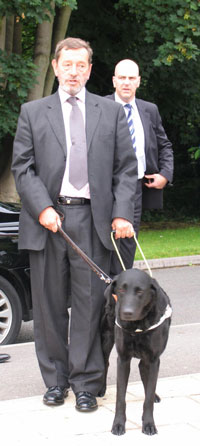Blunkett reveals reasons for recording memoirs
05/07/07
Blunkett reveals reasons for recording memoirs
 Former Home Secretary David Blunkett lifted the lid on the factors leading up to the publication of his memoirs when he visited Kingston University in South West London this week. The MP for Sheffield Brightside spoke frankly about his reasons for writing The Blunkett Tapes, which he described as “the first true reflection of a Government dealing with 24-hour-a-day, seven days a week news coverage in an age of unprecedented terrorismâ€.
Former Home Secretary David Blunkett lifted the lid on the factors leading up to the publication of his memoirs when he visited Kingston University in South West London this week. The MP for Sheffield Brightside spoke frankly about his reasons for writing The Blunkett Tapes, which he described as “the first true reflection of a Government dealing with 24-hour-a-day, seven days a week news coverage in an age of unprecedented terrorismâ€.
In a candid discussion session with his editor Sean Magee, staged as part of Kingston University’s Spirit of the Age conference, Mr Blunkett told how he decided to publish his memoirs following his resignation as Secretary of State for Work and Pensions in November 2005 to give his side of the story about his time in office. He explained that he had made a conscious decision to stick to political issues and take all personal references out of his diaries. “If I’d written about my private life, it would have been a bestseller, but I chose not to,†he said. “Quite a lot of reviewers were resentful I hadn’t gone into details. However, I had reached an agreement with my young son’s mother that I wouldn’t mention her and I didn’t.â€
Mr Blunkett began recording his memoirs on tape following Labour’s landslide victory in May 1997. “I got on a train to come down to London and I thought ‘I need to put some thoughts down because, at some point in my life, I will need to look back on this moment’,†he said. “I decided after a week of doing this, I might as well carry on. It wasn’t so much a diary as a way for me to keep a record.†By November 2005, Mr Blunkett had recorded his views on more than 18 tapes, which were transcribed into a million words.
Mr Blunkett also spoke about the differences between diaries and autobiographies. “In an autobiography you can take a broad swathe of events and put them down as you see them, whereas a diary should be a record of what you thought at the time,†he said. He added that sometimes he hadn’t referred to important events going on in the wider world in his memoirs at all. “You only put in your diary what sticks out as being important to you, not necessarily what shakes the rest of the world,†he said.
Mr Blunkett was speaking on the first day of Kingston University’s inaugural Spirit of the Age conference, a three-day event which will see a line-up of literary stars, including Hanif Kureishi, Rachel Cusk, Claire Tomalin, Victoria Glendinning, and Blake Morrison, outline their works and the inspiration behind them. The conference was organised by staff at Kingston University’s Centre for Life Narrative Studies based in the Faculty of Arts and Social Sciences to celebrate life writing and discuss the past, present and future of the genre. “An event like this is a really important part of celebrating adult education without the constraint of examination,†Mr Blunkett said. “I’m very keen that universities should re-engage with extramural activities such as this.â€
Kingston University’s field leader for creative writing, Dr Meg Jensen, said she hoped the conference would become a regular event. “Life writing covers traditional forms such as biographies, autobiographies, memoirs and diaries, but in recent years it has been used much more widely to include documentary films, witness and survivor accounts, oral and folk histories and virtually any form of narrative that draws upon a particular life or group of lives as its primary inspiration,†she explained. “The aim of Kingston University’s new Centre for Life Narrative Studies is to create opportunities to reflect on these different forms of writing and the Spirit of the Age conference has been a wonderful way for us to showcase the work of some of Britain’s most talented and well-respected writers in this area.â€